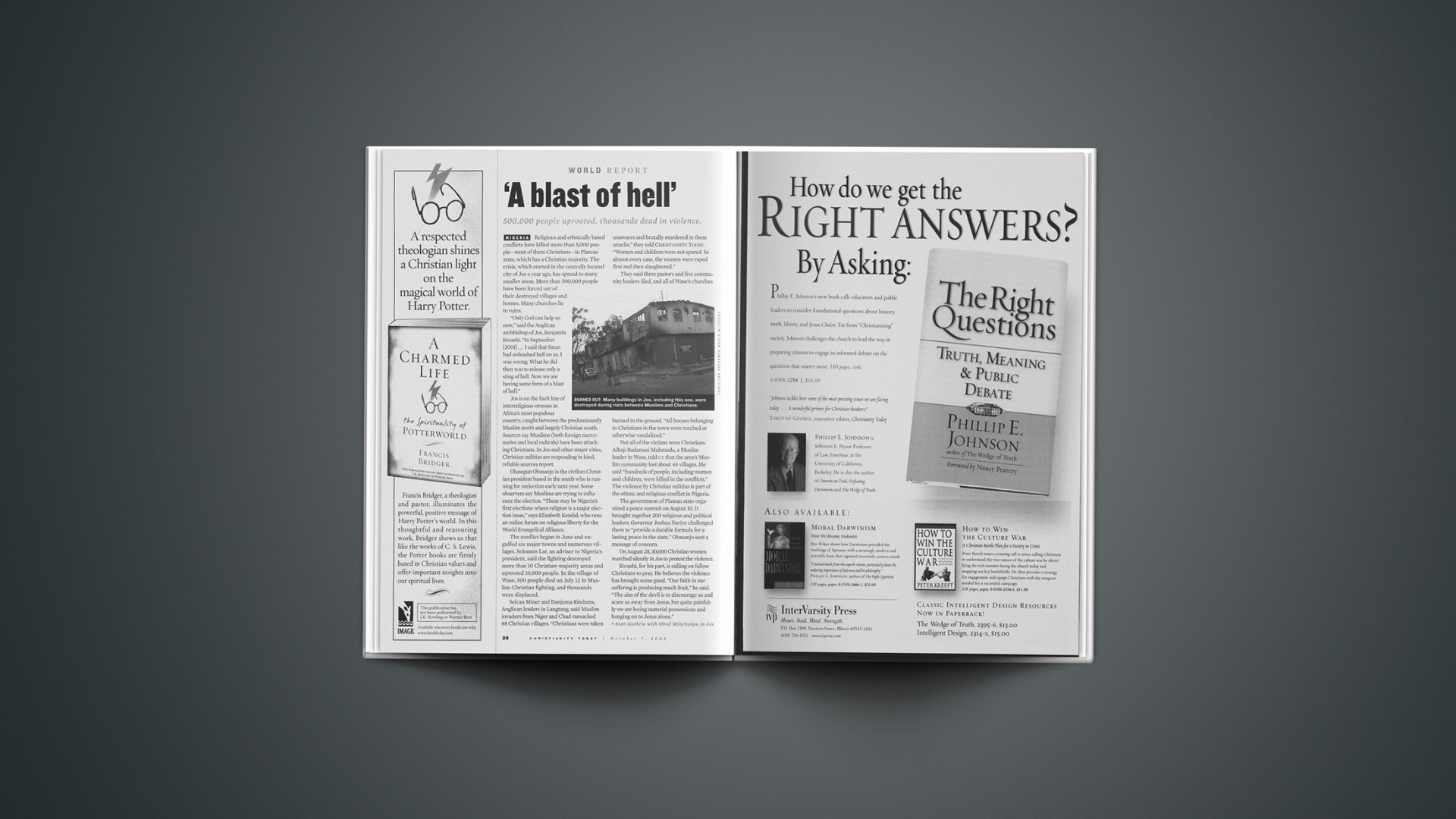Religious and ethnically based conflicts have killed more than 5,000 people—most of them Christians—in Plateau state, which has a Christian majority. The crisis, which started in the centrally located city of Jos a year ago, has spread to many smaller areas. More than 500,000 people have been forced out of their destroyed villages and homes. Many churches lie in ruins.
“Only God can help us now,” said the Anglican archbishop of Jos, Benjamin Kwashi. “In September [2001] … I said that Satan had unleashed hell on us. I was wrong. What he did then was to release only a sting of hell. Now we are having some form of a blast of hell.”
Jos is on the fault line of interreligious stresses in Africa’s most populous country, caught between the predominantly Muslim north and largely Christian south. Sources say Muslims (both foreign mercenaries and local radicals) have been attacking Christians. In Jos and other major cities, Christian militias are responding in kind, reliable sources report.
Olusegun Obasanjo is the civilian Christian president based in the south who is running for reelection early next year. Some observers say Muslims are trying to influence the election. “These may be Nigeria’s first elections where religion is a major election issue,” says Elizabeth Kendal, who runs an online forum on religious liberty for the World Evangelical Alliance.
The conflict began in June and engulfed six major towns and numerous villages. Solomon Lar, an adviser to Nigeria’s president, said the fighting destroyed more than 10 Christian-majority areas and uprooted 10,000 people. In the village of Wase, 500 people died on July 12 in Muslim-Christian fighting, and thousands were displaced.
Selcan Miner and Danjuma Rindams, Anglican leaders in Langtang, said Muslim invaders from Niger and Chad ransacked
88 Christian villages. “Christians were taken unawares and brutally murdered in these attacks,” they told Christianity Today. “Women and children were not spared. In almost every case, the women were raped first and then slaughtered.”
They said three pastors and five community leaders died, and all of Wase’s churches burned to the ground. “All houses belonging to Christians in the town were torched or otherwise vandalized.”
Not all of the victims were Christians. Alhaji Badamasi Mahmuda, a Muslim leader in Wase, told ct that the area’s Muslim community lost about 46 villages. He said “hundreds of people, including women and children, were killed in the conflicts.” The violence by Christian militias is part of the ethnic and religious conflict in Nigeria.
The government of Plateau state organized a peace summit on August 10. It brought together 200 religious and political leaders. Governor Joshua Dariye challenged them to “provide a durable formula for a lasting peace in the state.” Obasanjo sent a message of concern.
On August 28, 30,000 Christian women marched silently in Jos to protest the violence.
Kwashi, for his part, is calling on fellow Christians to pray. He believes the violence has brought some good. “Our faith in our suffering is producing much fruit,” he said. “The aim of the devil is to discourage us and scare us away from Jesus, but quite painfully we are losing material possessions and hanging on to Jesus alone.”
Copyright © 2002 Christianity Today. Click for reprint information.
Related Elsewhere
A Nigerian government commission investigating last year’s riots in Jos released a statement last week saying that the riots left 915 people dead and property damage over $25.6 million. This toll is far beyond earlier reports from the area.
For more on Nigeria and Shari’ah, see Yahoo’s Full Coverage and AllAfrica.com
Previous Christianity Today coverage of religious tensions in Nigeria include:
Where Adultery Means DeathPolitical and religious leaders clash in Nigeria over the increased use of Islamic law (May 8, 2002)
Archbishop Proposes to Die in Place of Woman Sentenced to StoningOkogie’s offer is a protest against Nigeria’s Islamic Shari’ah law. (Feb. 25, 2002)
Chronic Violence Claims 2,000 LivesThe adoption of Islamic law in northern Nigeria has ignited conflict between Christians and Muslims. (Jan. 7, 2002)
Hundreds of Christians Take Shelter in Barracks After Riots in NigeriaSome report that violence since mid-October has left more than 200 dead. (Nov. 1, 2001)
Religious Riots in Nigeria Leave Hundreds DeadLeaders condemn the use of religion as a tool for violence. (Oct. 2, 2001)
Orphaned and WidowedChristian families devastated since Shari’ah law adopted. (August 29, 2001)
Christians and Muslims at Odds Over Nigerian ConstitutionCalls made to limit Shari’ah law in Northern states. (July 12, 2001)
Nigeria Officials Press Northern Governors to Scale Back Islamic LawChurches harassed by Islamic youths purporting to enforce the law. (June 14, 2001)
Five Anglicans in Court After Rescuing Teenagers From Arranged MarriagesPriests claim Christian sisters are being forced into Islam. (June 5, 2001)
The Shari’ah ThreatMuslim Fundamentalist law troubles Christians and some Muslims. (Feb. 2, 2001)
‘Focused, Determined, Deliberate’ DestructionEcumenical leader calls on Nigeria to deal with religious violence between Muslims and Christians. (Oct. 30, 2000)
Nigerian Muslims and Christians Form a Religious CouncilGombe, a north Nigerian state, creates a council of faiths to deal with fears over Islamic law. (Sept. 19, 2000)
Churches Challenge Islamic LawChristians plan to take Shari’ah to court. (Aug. 15, 2000)
Is Nigeria Moving Toward War?Deadly riots lead to suspension of Islamic law. (March 31, 2000)
Nigeria On the Brink of Religious WarNorthern states adopt Islamic law, increasing Christian-Muslim tensions. (Dec. 16, 1999)
Nigeria’s Churches Considering Legal Challenge to Islamic LawsThird state moving toward implementing Koranic laws (Dec. 17, 1999)
Can Christianity and Islam Coexist and Prosper?Is peace with Islam possible? (Oct. 25, 1999)










